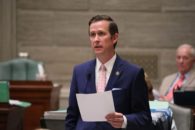JEFFERSON CITY, Mo. — Missouri’s Department of Natural Resources (DNR) expects to receive $1.4 billion for the state’s water systems over the next five years from the recently-passed federal infrastructure bill.
An estimated $866 million was allocated for the state’s Drinking Water State Revolving Fund, according to White House estimates.
And additional funding was earmarked for Missouri’s wastewater systems, Connie Patterson, a DNR spokeswoman, said. While the exact figures for the wastewater systems are not yet available, Patterson said the department’s estimate is based on previous federal allocations for the state.
DNR Deputy Director Hannah Humphrey joined other representatives from the department before the House Subcommittee on Federal Stimulus Spending this week to discuss the estimates and DNR’s plans for the funds.
“We’re still wading through it. What we have been following pretty closely as it was drafted is what is on the horizon for our state funds, especially when related to water and wastewater funding,” Humphrey said. “The reason this is so exciting and challenging is that grant amounts for water infrastructure have been trending down since the 70s, so this really is a historic opportunity.”
More specific plans are expected to be released in early 2022 as DNR works with contractors to approve funding projects.
The package appropriated an estimated $43 billion for water systems across the country to be doled out over the next five years, Humphrey said. The bill was signed into law by President Joe Biden Monday.
Education funding
Representatives from several Missouri universities presented their American Rescue Plan Act (ARPA) funding requests for programs and expansions, and Department of Elementary and Secondary Education (DESE) Commissioner Vandeven gave an update on her department’s investments in recruitment and retention. The department plans to set aside more than $52 million in Elementary and Secondary School Emergency Relief (ESSER) with the final $18 million included in the fund’s third phase pending appropriation.
Vandeven said the most important element of a child’s education was their teacher, an investment the department was excited to make.
“We see this as a once-in-a-lifetime opportunity to help our kids,” Vandeven said. “We have a very dedicated staff trying to do the right thing, and it is wonderful to hear lawmakers talking about ways to help our students.”
Staffing has been a concern of the department for several years, but the pandemic further solidified the need for action, Vandeven said.
DESE is spearheading multiple efforts to bolster the state’s education workforce over the next three years, including an investment in its Pathways To Teaching Careers Program which seeks to ensure students are ready for an education career upon graduation. The department is also committing $50 million in local teacher recruitment and retention efforts, allowing districts to apply for $10,000 grants.
The department launched a new recruitment initiative last week, compiling resources for prospective educators to widen its application pool.
The last decade saw a 25 percent drop in enrollment for teacher preparation programs, according to DESE, significantly impacting urban and rural schools and education areas that are harder to staff, such as special education and math.
For the past six years, Missouri has reported an 11 percent turnover rate without replacements, exceeding the 8 percent national average, according to DESE.

Cameron Gerber studied journalism at Lincoln University. Prior to Lincoln, he earned an associate’s degree from State Fair Community College. Cameron is a native of Eldon, Missouri.
Contact Cameron at cameron@themissouritimes.com.




































